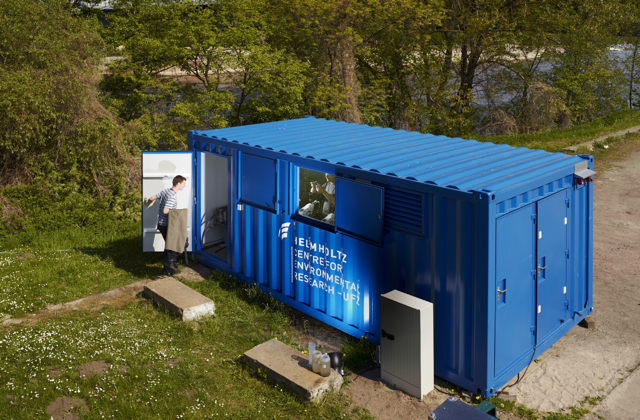
MOBICOS – Experimental aquatic ecology in a box
The empirical analysis of ecological interactions always presents scientists with a number of difficulties: while laboratory essays usually coincide with a loss in naturalness and complexity, field studies are often impaired by limited control options. The new experimental facility MOBICOS operated by the Helmholtz Center for Environmental Research – UFZ bridges this gap by merging the opportunities of experimental manipulation and replication with the naturalness of field studies.
MOBICOS consists of container-based laboratories operated as bypasses to natural water bodies using submerged pumps. Different experimental facilities such as flow channels, pelagic chambers or sediment compartments are fed with a controlled discharge of field water. This allows a wide spectrum of experimental manipulations such as resource supplementations, temperature alterations and/or hydraulic modifications, whereas the latter environmental background remains unchanged. Six MOBICOS containers are currently exposed along a land use gradient within the Bode catchment (Harz, Germany), thus facilitating experimental studies on the effects of anthropogenic-induced environmental changes on freshwater ecosystems.
For further details please contact the project coordinator at the Helmholtz-Center for Environmental Research – UFZ.
Current projects:
- Regulation of river biofilms in multiple stressed ecosystems. (Contact: Patrick Fink)
- Grazer control of benthic algal biomass: The role of food quality on different levels of spatial organization (DFG-BIOFILM-HETEROGENEITY). (Contact: Patrick Fink)
- Homogenisation of ecosystem functioning between Temperate and Neotropical streams due to agricultural land use (DFG-HECTARE). (Contact: Mario Brauns)
- Chemical-induced tolerance shifts in photoautotrophic biofilms. (Contact: Mechthild Schmitt-Jansen)
- Interactions between flow hydrodynamics and biofilm attributes and functioning in stream (DFG-BIOFLOW).(Contact: Markus Weitere)
